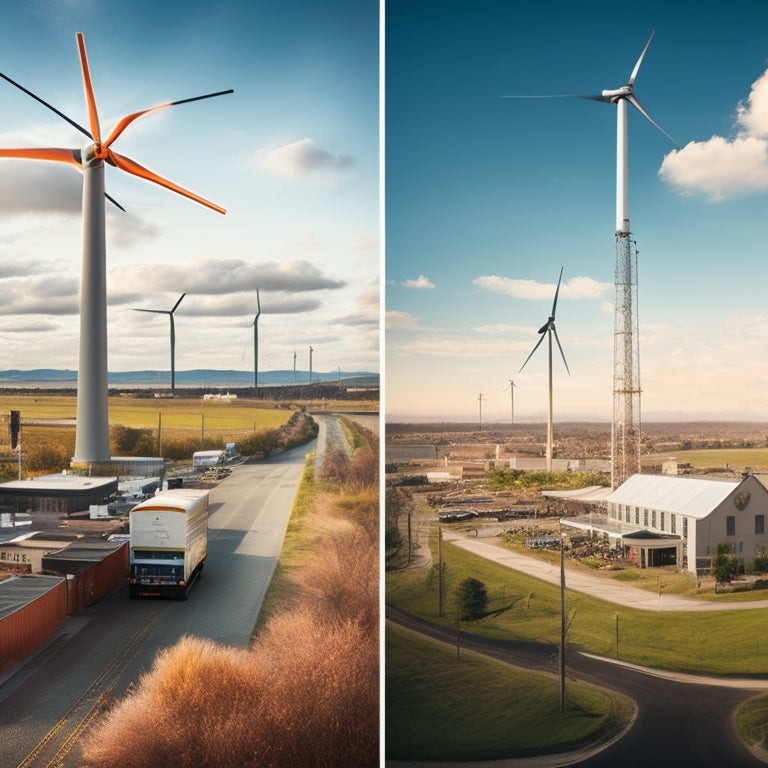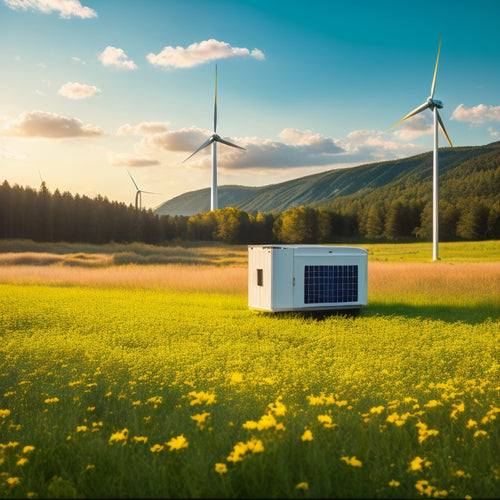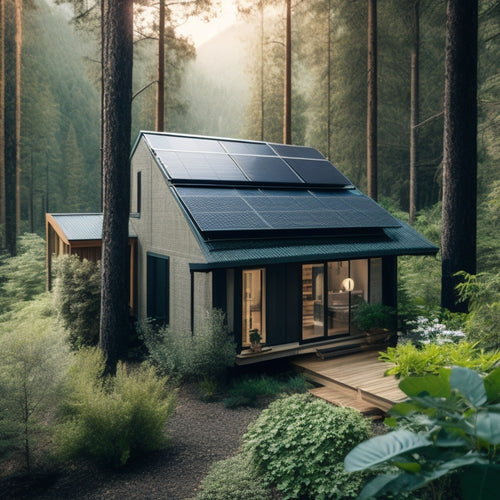
Why Off-Grid Energy Costs Less Over Time
Share
You'll likely save thousands of dollars over the next 25 years by shifting to off-grid energy. The initial investment in solar panels, although critical, leads to lower energy bills over time, with minimal maintenance required and no fuel costs incurred. Off-grid energy systems also enhance your property value, attract eco-conscious buyers, and provide government incentives and rebates. Plus, you'll enjoy long-term energy savings and reduced reliance on traditional sources. With all these benefits combined, you'll be shielded from market fluctuations and enjoy predictable energy expenses - and that's just the beginning of your expedition to energy independence.
Overview
- Off-grid energy systems reduce energy bills over time, saving homeowners up to 50% on energy costs over 25 years.
- Minimal maintenance requirements and no fuel costs ensure lower operational expenses for solar panels and off-grid systems.
- The initial investment in off-grid energy leads to predictable energy expenses, shielding homeowners from market fluctuations.
- Government incentives and rebates, such as federal tax credits, help offset the upfront costs of off-grid energy systems.
- Off-grid energy systems increase property value, selling for up to 17% more than traditional homes, and provide long-term energy savings.
Upfront Solar Panel Installation Cost
The initial investment in solar energy, namely the upfront solar panel installation cost, is an essential consideration for those looking to shift to off-grid energy.
You'll need to decide on the type of solar panel that suits your needs, as prices vary between monocrystalline, polycrystalline, and thin-film panels.
Ideal system size is determined by location and roof space, affecting energy production and overall cost.
On average, the cost of solar panels ranges from $2.50 to $3.50 per watt, with a typical residential system requiring around 5,000 watts.
Assessment of energy usage patterns is essential to identify daily requirements and peak periods, which can also impact the overall cost of the system.
Installation financing options, such as loans or power purchase agreements, can help spread the cost over time.
Lower Operating Expenses Over Time
Once you've made the initial investment in your solar panel installation, you'll start reaping the benefits of lower operating expenses over time. As you move towards energy independence, you'll notice a significant reduction in your energy bills. This is because solar panels require minimal maintenance and have no fuel costs.
| Component | Frequency | Cost |
|---|---|---|
| Panel cleaning | Quarterly | $100 |
| Inverter replacement | Every 10 years | $2,000 |
| Annual inspection | Annually | $500 |
| Battery replacement | Every 5 years | $1,500 |
With maintenance efficiency, you'll save money on operational costs, allowing you to allocate resources to other areas of your life. By switching to off-grid energy, you'll be free from the constraints of traditional energy providers, enjoying the freedom to live life on your own terms.
Increased Property Value Benefits
By integrating off-grid energy systems into your property, you're not only reducing your reliance on traditional energy providers but also greatly enhancing your property's value.
According to the National Renewable Energy Laboratory, homes with solar panels sell for up to 17% more than similar homes without them. This increased property appeal can be attributed to the growing demand for sustainable living and the long-term cost savings that come with off-grid energy.
In fact, off-grid solar battery systems can increase property value by 3-5%, appealing to eco-conscious buyers. As a result, your property becomes more attractive to potential buyers who value energy independence and environmental responsibility.
This increased value can lead to a higher selling price, making your investment in off-grid energy a wise one.
Government Incentives and Rebates
Solar-powered savings extend beyond your energy bills, as government incentives and rebates can greatly offset the upfront costs of your off-grid energy system.
Considering the type and quality of equipment used in your system, high-quality equipment can guarantee reliability, durability, and performance, which can also impact the overall cost.
You're eligible for federal tax credits of up to 30% of the total system cost, markedly reducing your initial investment.
Additionally, many states offer rebates and energy efficiency programs that can further lower your expenses.
You can also tap into renewable energy incentives, such as net metering programs, which allow you to sell excess energy back to the grid and offset your utility bills.
Long-Term Energy Savings Guarantee
Frequently, homeowners who invest in off-grid energy systems reap the benefits of long-term energy savings, guaranteed to reduce their reliance on traditional energy sources.
You'll enjoy a predictable energy expense, as your system generates power on-site, shielding you from volatile market fluctuations. With off-grid energy, you're not bound to the grid, and that means significant long-term savings.
In fact, studies show that off-grid homeowners can save up to 50% on their energy bills over a 25-year period. By opting for sustainable living and energy independence, you'll not only reduce your energy costs but also minimize your carbon footprint.
This guarantee of long-term energy savings provides a sense of security, allowing you to focus on what matters most – living life on your own terms.
Frequently Asked Questions
Can I Install Off-Grid Energy Systems in Urban Areas?
You can install off-grid energy systems in urban areas, but you'll face unique installation challenges, such as limited space, noise restrictions, and permitting obstacles, requiring careful planning and creative solutions to overcome these urban off-grid hurdles.
Are Off-Grid Energy Systems Suitable for Small Homes or Apartments?
Did you know 70% of US households can benefit from off-grid energy? You can achieve energy independence and significant cost savings in small homes or apartments by installing off-grid systems, like rooftop solar, perfect for urban dwellings.
How Do Off-Grid Energy Systems Handle Power Outages?
You'll experience uninterrupted power supply during outages with off-grid energy systems, thanks to battery storage that stores excess energy generated from renewable sources, ensuring your freedom from grid dependence and reliability on a consistent power supply.
Can I Sell Excess Energy Back to the Grid?
You're not just independent, you're a energy entrepreneur! With net metering benefits and energy buyback programs, you can sell excess energy back to the grid, offsetting your bills and maximizing your off-grid investment - it's like getting free energy!
Do Off-Grid Energy Systems Require Frequent Maintenance?
You'll find that off-grid energy systems, designed for system longevity, typically require less frequent maintenance, with most components lasting 20-30 years; you'll perform routine checks, but major overhauls are rare, giving you more freedom to enjoy your independence.
Ready to Buy
You've crunched the numbers and it's clear: off-grid energy is the way to go. That initial solar panel installation cost? A drop in the bucket compared to the long-term savings. Your wallet will thank you, your property value will soar, and the government will even throw some cash your way. And let's be real, who doesn't love a good guarantee? So, go ahead and flip the switch - your future self (and the planet) will appreciate it.
Related Posts
-

Sustainable and Eco-Friendly Generators for a Reduced Carbon Footprint
Sustainable and eco-friendly generators are perfect for cutting your carbon footprint and increasing energy efficienc...
-

Essential Hiking Lights for Safety and Fun
When you're hitting the trails, essential hiking lights are vital for safety and fun. A lightweight headlamp offers h...
-

Off Grid Solar Batteries
As you shift to off-grid living, you'll rely on high-performance solar batteries to store excess energy generated by ...


